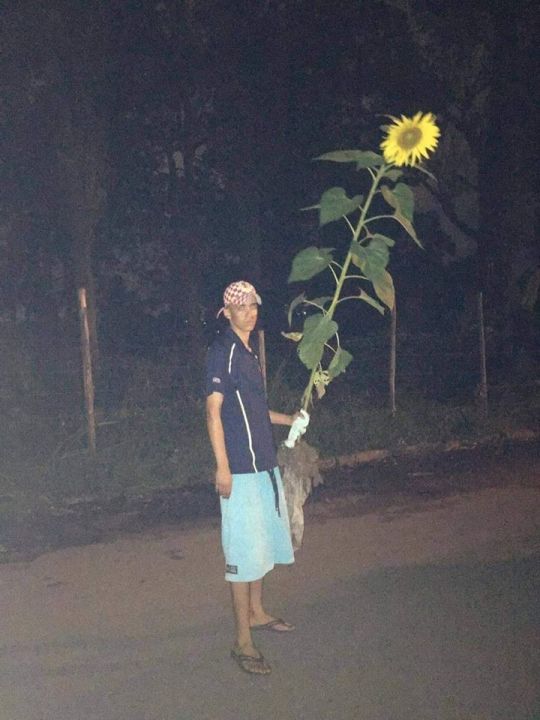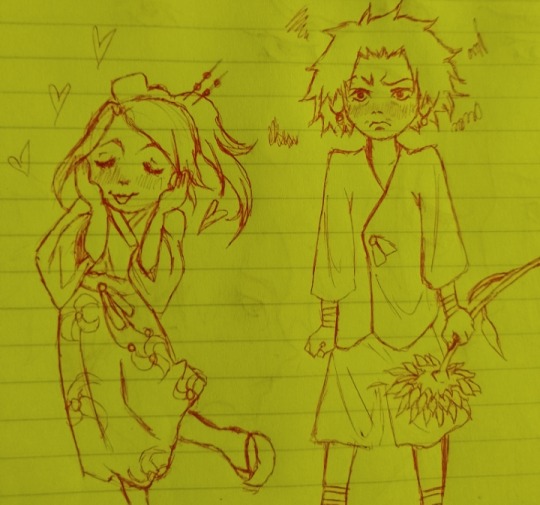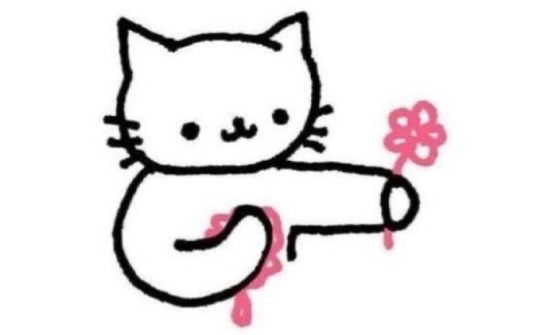#fuugen
Note
Do you have any fic recs? Fuu x Mugen or otherwise because I am absolutely in love with your writing style and prose but have read everything at least thrice AND counting. So I am so sure your faves will also be bangin'! Also am about to check out that controversial fuugen fic you posted about!!!
Huge content warning on the controversial one as it contains dubcon/underage elements so if that bothers you…tread lightly!
A Treatise on the Price of Sugar in the Edo Period (1603-1867)
And here are some more! Not comprehensive by any means, these are just the ones that first popped into my mind:
Finding the Four-Eyed Samurai...With You?! - this one is a given but I’ll recommend it until my dying breath. Post-canon, in-depth historical research, fantastic storytelling. Chefs kiss. Linking the Ao3 version as those are the chapters the author has re-written, but there’s way more on FF that she is working on eventually re-writing. (I also love her to pieces she’s on here as @ryukyuan-sunflower !)
Though the Heavens Fall - another longtime favorite that is sadly unfinished but worth checking out.
Opportunity and Motive - a quick two parter.
Birthdays - short and sweet, the third chapter is so so so cute.
Birthday Booty - my one modern AU recommendation 🥲 (There’s just so few… I’m really doing my part in the fandom lol) Hear me out on this one: it is hilarious and surprisingly cute? Mugen cracks me up in it he’s so gross. I also think the author nailed their personalities. Jin gets the short end of the stick per usual but it’s funny anyway.
My apologies if you’ve read these already—the fandom is small!

42 notes
·
View notes
Text

I was sketching thinking of Mugen and Fuu I might get around to finishing this at some point we will see
12 notes
·
View notes
Text

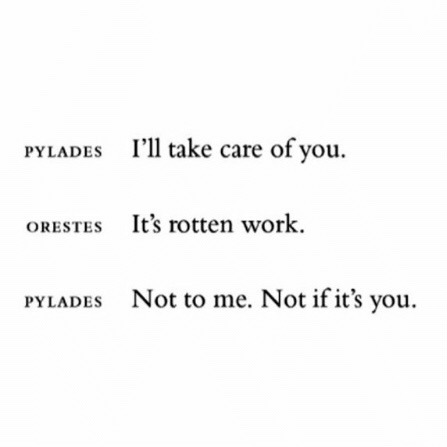
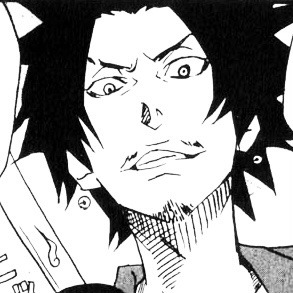
fuu and mugen
#samurai champloo#mugen#fuu kasumi#mugen samurai champloo#fuugen#matching icons#BYEEE THIS IS LITERALLY THEM#and HONEY THIS GOES BOTH WAYS#so I guess i’ll just drop my rambles on the tags#whether u see them as platonic or romantic its still APPLICABLE and i think thats beautifull#mugen being the idgaf dude then at the same time saving her ass numerous times#then episodessss later hes shown to truly care for her#CHHHHATTAAAAATERRRDRVSLOPMENFFFFF#he grows to care others aside from himsellffffffff
112 notes
·
View notes
Note
Hey, don’t want to pressure, but when are you planning on releasing the update for FTFESWY?
Please excuse the ridiculously late reply!
Chapter 51 Lingering Lamentations of Finding the Four-Eyed Samurai...WITH YOU?! has just been updated on Fanfiction.net today! (Dec 11th, 2022)
However, I noticed that I did not get a notification email for the update, nor did some of my readers. Apparently, Fanfiction.net has a new service that now requires readers to click the tab on their profile to "allow notifications." If you have been following this story but did not get a new email, please go into your account and reallow notifications! My updates can be pretty sparse, so it really pains me to know that most of my followers now have no idea I've updated, and will be updating again in a few weeks, because of this stupid thing they've changed.
Anyway, this chapter is very short by comparison to my others, only around 10,000 words. This is because the next chapter that goes in-depth into Fuu's childhood spans a whopping 30,000 words now, just as Chapter 49 From Hell to Heaven did for Mugen's past. Please look forward to it!
#fuugen#samurai champloo#mugen and fuu#yup im still working on this monstrosity and have 20 chapters to rewrite and 10 more new ones to write too#fanfiction
30 notes
·
View notes
Text
1 fanfic updates after a long hiatus and suddenly I can no longer function as a human being
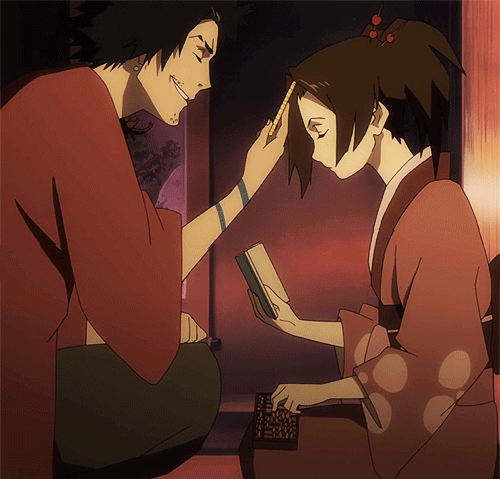
#fuugen#samurai champloo#fuu kasumi#mugen samurai champloo#they have one of those retractable leashes on for which they use to drag me back in according to their whims 🙂
40 notes
·
View notes
Text
my dear sleeping fuu
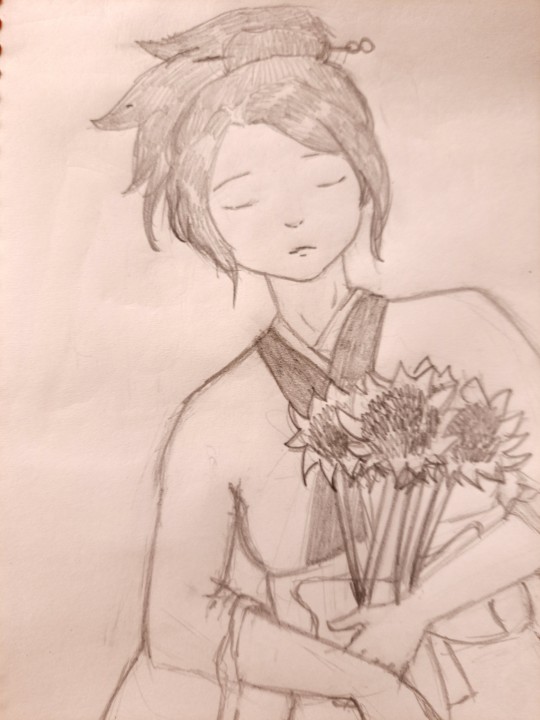
8 notes
·
View notes
Text
Thoughts on the 3rd ep of Hypmic Rhyme Anima+. Spoilers beware
Season 1 | Ep.1 | Ep.2 |
i love how its samatoki who tsks when ichiro talks, they never stop and i love it
fuugen looking dude still has a great design
love the fact that they kept the Ramuda is scared of ghosts plotline ww
TBH is a silly name DJ or not, but it does tie in some ARB lore
eyyy joint mission! does that mean that nagoya and oosaka will be enemies? might be and interesting naughty busters and MCD interactions
OFC theres gonna be some good good ichiro/kuko and samatoki/sasara
KUKOOO I LOVE YOU
the kinshachi! love those little dudes, they're tiger-headed dolphins lol
JYUSHIIII you chuuni dork i love your flowery wordss
Mr. Kuko wwwwwwww
nooo amandaaaa so ripped up
oh more visual kei!! i am so happyyy
www this villain is so silly i love silly villains. how unfortunate that they'll be plot slaves but they genuinely had something fun going on
awww look a kuko being silly and amagani being a silly lawyer
LETS GOOO JAKUHITOOO
eyyyyy lets go grandmaaaa the MVP of repairing Ichikuko relationship
lets gooo naughty butters!!!!! i love themmmm were they also a influence ichiro to get onto the right track? thats sweet
ofc they had to tie in different characters together still
love that sun shadowing them the moment they talk about the villains
the squeakkkkkkkkkkk amanda thats so cuuteeeeee
awww no magical girl transformation? rip
-
Damn the imagery on this MV goes super hard i love the non-traditional stuff you'll find scattered around
at a glance the ones i spot are:
buhddist funeral rites with from, what i can count 39 candles which can mean thank you…
those funeral flowers look like white chrysanthemums (grief, honesty, truth which the later two may be nods to the fact that they're not in their right minds), pink, and purple carnations which symbolize capaciousness and unpredictability
Kuko also references gokurakujoudo which is the most well known higher buddhist celestial land known as the land of bliss so basically he's saying that he's so hot shit that he'll reincarnate into the holiest of holy lands
Ragnarok is the end of the known gods according to nordic mythology aside from like. two gods and two humans which means either Jyushi is a ghost as shown in the scene or he's just that cool and survived
Kuko's second verse is a reference to old paintings that depicted monks training their spiritual disciplines by mountainsides. if you're an old soul like me, think Libra Dohko's Mnt. Roshi
Hitoya's second rap scene is mimicking an egyptian depiction of a weighing of the heart, specifically it seems to be parodying the scene found in the Papyrus of Hunefer. interestingly, the three opponents are on the side in which the feather of maat is commonly depicted on, the thing which the heart is weighed against while Amanda is the heart
Hitoya and Kuko's spots on the papyrus is where anubis would be, setting them as the judges who preside over this battle. Jyushi is also sitting where Ammit, the devour of the dead, would be depicted sitting. Ammit is also a goddess, which is fun
Given the red moon behind him, Jyushi also plays at a fallen angel
The chorus' first scene is another very famous generic buhdist scene. while i don't think it references anything specifically, the three sitting on lotus flowers and the bodhi tree's in the back implies that they are buddah. like no joke, they are actually buddha
don't know if this is actually a reference, but the red hell-like place that the three find themselves in might be Sañjīva, one of the buddhist naraka's where those who are reincarnated there are born fully grown and are attacked by other people and monsters
return of the kinshachi!
kaleidoscopic imagery which is also heavily associated with buddhist imagery
That ending is a reference to the spider's thread by ryunosuke akutaguwa! you might remember it if you've played Danganronpa V3 but its a story about a man trying to escape from hell from a spider thread but ultimately falls back into hell because of his greed
-
that Obaaachannnn is so cute. and the bait and switch was so silly
Kuko as always is just the absolute star of the show even if the spotlight isn't on him
Huh???? Are Doppo and Hifumi okay???? Please??? you can't just cliffhang that???? how dareeee
Badass Temple endingg lets gooooo
Kuko verson is so cute!!! that illust tooo
Jyushi is just so stylish and silly, treading that fine line. also is that just water in his champagne glass www
this is such a fun ending version i love it. Its just a lot warmer and more comforting in my opinion, super sweet and heartwarming. a lot more electric guitar as well
I'm so glad for their first feature episode I really enjoyed BAT! The song was such a banger and the imagery along with it so evocative. I really liked the episode how it brought everyone together for a chaotic jaunt. I hope next week with dotsuhompo will be just as silly
#hypmic#hypnosis microphone#Hypnosis Mic: Division Rap Battle: Rhyme Anima+#hypnosis mic rhyme anima#hypmic spoilers
4 notes
·
View notes
Note
okay i'm properly finishing the tutorial now. i find it fun to listen to the characters when they talk <3
(thank u hu geng (hu gen??? idk) for teaching me 大丈夫 i guess tho?)
i believe it is hu geng, tbh it gets difficult playing on JP bc, at best, you'll get the furigana that's like. fuugen for him </3
But so real, the voice actors are so neat, it's really fun to just listen to them <3
5 notes
·
View notes
Text
I live for the "I don't want anything. Being by your side is enough" ship trope.




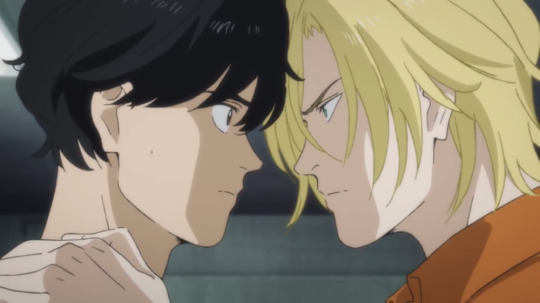



#shitpost#gintsu#eremika#yumihisu#yumikuri#fuugen#inukag#ash x eiji#royai#obamitsu#forgot to add this#six of them don't even end up together....#i love my angsty ships
312 notes
·
View notes
Text

Had to do some couple pose practice with my OTP ❤️❤️❤️
I feel like whenever I don’t know what to draw I draw them ☺️
35 notes
·
View notes
Text

Smooch !!
#anyway look at this super cute couple who cosplayed as fuugen !!!#fuugen#samurai champloo#this has been on my drafts for like forever!#thanks for this cosplayers for letting fuugen happen lol#the interviewer is such mood
9 notes
·
View notes
Text
The Meaning of Mugen's Triangle: How Samurai Champloo is a Love Letter to Director Akira Kurosawa and Actor Toshiro Mifune


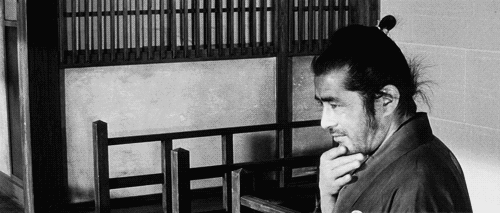
It has been commonly recognized that Jin’s kamon crest of four diamonds is in direct reference to the Takeda samurai clan. Jin's master Mariya Enshirou was a real historical figure who both owned the Mujushin Kenjutsu Dojo, as well as belonged to the Takeda clan. Fuu’s floral pattern appears to reference her connection to the Sunflower Samurai. But Mugen’s hollow white triangle is the most subtle symbolism of all, and I've not seen a single post about it, or anything in relation to Champloo and Kurosawa, for that matter. So here we are. Yet another Samurai Champloo essay. Kept you waiting, huh.
Mugen is not of samurai heritage, so it is not a samurai’s kamon family crest… Or…is it? Well, yes and no.
Mugen’s character as a whole is an amalgamation of three characters from the most famous samurai films of all time: Seven Samurai, Yojimbo, and Rashomon. All three of these legendary masterpieces were directed by the renowned Akira Kurosawa and star the equally renowned actor Toshiro Mifune. This director and actor dynamic duo collaborated on a whopping 16 films together and left an impact on cinematography that continues to inspire filmmakers to this day.
Much of Mifune’s body language, intensity and speech seem to have played a heavy influence into the design of Mugen. Please enjoy a close analysis into the many ways Kurosawa's works influenced the plot and characters of Samurai Champloo:
Spoilers Below
Seven Samurai: Mifune as Kikuchiyo

Regarded as one of the best films in history, let alone the best samurai film of all time, Seven Samurai released in 1954 and it is worth noting that Samurai Champloo aired in Japan in 2004: the fiftieth anniversary year of its release.
This 3 and a 1/2 hour epic is considered one of the most influential films to date, inspiring numerous directors from George Lucas to Quinton Tarantino. Even more specifically, the plot of the following are all based directly off of it:
Star War’s The Mandalorian Episode 4.
Pixar’s A Bug’s Life
The spaghetti western Magnificent Seven.
And these are just a few examples of Seven Samurai’s legacy.
Samurai Champloo is no exception. From his body language, personality, backstory and dialogue, Mugen himself is largely based off of the most compelling of its characters: Kikuchiyo. More specifically, Kikuchiyo is where Mugen’s triangle crest originates.
Plot: In 1587, a farming settlement is going to be attacked by a group of bandits that had raided them the previous year. To prevent this from happening again, some of the farmers head into the city to enlist the help of samurai. However, they have no money to offer, only food, so they search for poor, hungry ronin that would be willing to take the job.
(This in itself, is how Fuu enlists Mugen in episode 1: a promise of 100 dango if he saves her. Working just to eat becomes a repeated theme and gag.)
The first samurai the farmers hire becomes the leader of the group, and devises a plan to hire six more samurai to create proper defenses to fight the bandits. They manage to enlist five more samurai for the purpose, but time is running short, and they lament that they could not find a seventh member.
Enter Toshiro Mifune’s character.
Man Talking About Kikuchiyo: "Hey, I just found a really tough samurai! There was a huge fight. They were no match for him. Never seen anything like it. He’s like a wild dog!"
Man Talking About Mugen: "Yes, those were the flashing eyes of a stray dog."
(Episode 9 references Mugen as a dog in four lines of dialogue. Worth nothing, Mifune stars in another Kurosawa film titled "Stray Dog".)
The Character Kikuchiyo: Unlike the other six samurai chosen for the mission, Kikuchiyo is not a samurai at all. He lies about being so. In fact, his real name is not Kikuchiyo either. The rogue is wild, arrogant, rude, uncouth, likes to drink, goofy, and serves as comic relief for much of the film. But he has a deep interest in wanting to learn how to be a skilled warrior. He goofily sizes up the party leader and wants to learn from him, but is too embarrassed to ask.
Like Mugen, it is implied he may be illiterate and may not know basic math, because to prove he is of samurai blood, the drunken vagabond pulls out a scroll of his family lineage. They ask him if his name is Kikuchiyo and he says it is. The samurai then all laugh at him…because according to the lineage scroll, that would mean he is only a thirteen year old boy. He had stolen the scroll just to pretend to be a samurai.
(A similar gag of mistaken family lineage on a scroll is used in Episode 22 Cosmic Collisions, when Jin points out that the zombie Shige has no connection to the Heike clan.)
In actuality, Kikuchiyo is just a peasant farmer himself, that just carries around a sword because he can. He holds a deep resentment of samurai for how they treat farmers, but he himself desires to be a samurai, to show his worth in his fighting. Although the six samurai head out without a seventh in their party, Kikuchiyo follows them along anyway, and joins in on the mission of defending the farmers, against their wishes.
(While it is never stated in the anime that Mugen was once a farmer before becoming a pirate and thief, the history of the Ryukyuan Kingdom and specifically, the Miyakos implies Mugen may have been a poor farmer under the subjugation of the Satsuma Domain. The Miyakoan people were expected to pay a poll tax to Satsuma samurai, which is referenced in Episode 14, when Mugen attempts to steal the Satsuma ship that is collecting raw sugar from the Miyakoans. Like Kikuchiyo, Mugen would have been a peasant with a hatred of samurai.)
The Origin of the Triangle Crest
One of the samurai, Heihachi, sews a war banner as a symbol of their mission to protect the farming village and a way to rally them.

Kikuchiyo: "What do those symbols mean?"
Heihachi: "That means "rice" but it can also mean "farmer"."
(The hiragana for "ta" at the very bottom of the flag is short for the word "tanbo", which means rice paddy.)
Kikuchiyo: "What about those circles?"
Heihachi: "They're us."
Kikuchiyo: "What the hell? Why aren't I there? There's only six of them!"
Heihachi: "The triangle is you, Lord Kikuchiyo."
Thus, the mystery of Mugen's red haori is officially solved.
Later in the film, when the farmers take heavy losses and one of the seven samurai dies, morale severely drops. It is Kikuchiyo, who had been for most of the film, a seemingly unserious joke of a character, who grabs the flag and puts it on the roof of a house so everyone can see it, rallying the village back to the cause.
Kikuchiyo and the triangle represents, that although he was not born as a samurai, he is the essence of the code of bushido and the noble values of what an ideal samurai should be. Both Kikuchiyo and Mugen are samurai in all but official title and heritage. They are brave warriors with integrity, skill even if it not formally trained and with an intense desire to protect.
The lyrics of the full version of Samurai Champloo’s opening theme Battlecry allude to this concept. While the first verse played in the anime references Jin, the extended version of the song not played in the anime heavily references Mugen in its entirety.
Link To Full Song Here
It also references how Mugen and Samurai Champloo is the spiritual successor to Shinichiro Watanabe's previous work Cowboy Bebop and Spike Spiegel.
It references Mugen's connection to the ocean and piracy, as well as the imagery evoked in his near death experience in episode 14.
It references his evolution as a man and Fuu's importance in his growth by the end of the anime.
"Look, just the air around him
An aura surrounding the heir apparent
He might be a peasant but shine like grand royalty
He to the people and land, loyalty"
"We witness above all to hear this
Sea sickness in the ocean of wickedness
Set sail to the sunset, no second guessing
Far east style with the spirit of wild west
The "quote-unquote" code stands the test of
Time for the chosen ones to find the best of
Noble minds that ever graced the face of
A hemisphere with no fear, fly over"
The blue yonder where
The sky meets the sea
And eye meets no eye
And boy meets world
And became a man to serve the world
To save the day, the night, and the girl too"
Most of Mugen’s dialogue references Kikuchiyo. Both use improper, informal speech, curse often and insult others. They are both comically lecherous womanizers. Kikuchiyo offers to cut a woman's crops in exchange for a little "somethin' somethin'", much like how Mugen helps Yatsuha in exchange for getting nookie in episode 15. Kikuchiyo insults his bald samurai mentor (who pretended to be a monk previously) similar to how in Episode 10 and 12, Mugen insults the monk he wants to learn from (who once was a samurai).
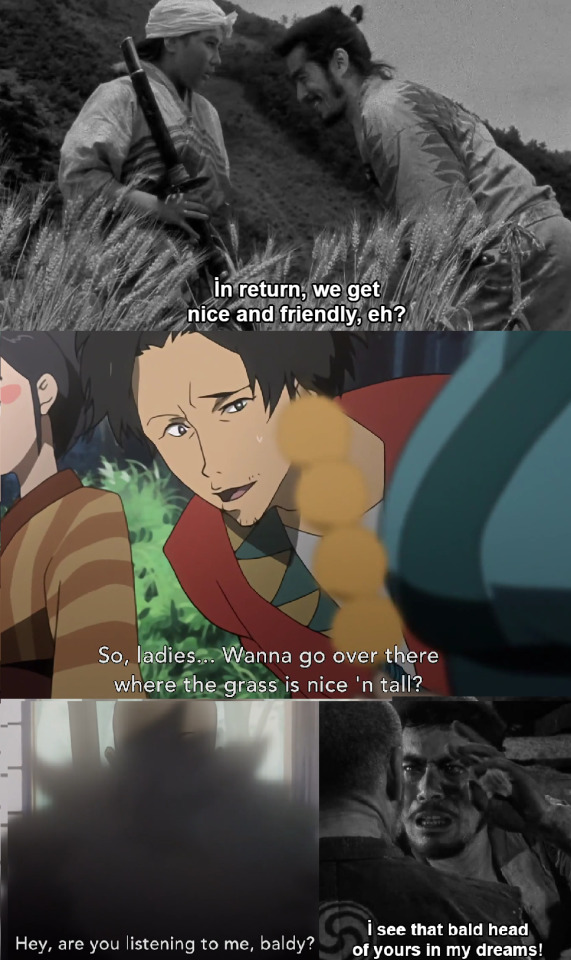
Jin also seems to be influenced by another character, whose archetype is the masterful, quiet, skilled samurai that Kikuchiyo wants to compete with.
The character Kyuzo: Silent, dead serious and the most skilled of all the samurai in the group, this samurai exists only to test the limits of his skills. At one point in the story, Kyuzo infiltrates the bandit camp and steals one of their matchlock guns, which was proving detrimental to the farmers. Not one to be outdone, the arrogant Kikuchiyo ends up infiltrating the enemy camp to also get a gun and to show off he is just as skilled. However, since he wasn’t at his post, the bandits broke into their defenses.
(Something similar can be seen specifically in Episode 23 Baseball Blues. After Jin scores a homerun, Mugen is not one to be outdone and also scores a homerun, and sprints past Jin. However, he is outed for passing the previous runner.)
The finale of Seven Samurai, which I will not spoil, shows a sense of equality between the wild Kikuchiyo and the far more skilled Kyuzo as warriors.
Another samurai character Katsushiro, develops a romance with a peasant woman named Shino, similar to how Jin’s romantic interest is named Shino in episode 11. Shino’s father is named Manzou…which is also the name of the detective of Samurai Champloo episodes 5, 12 and 23.
Yojimbo: Mifune as Sanjuro
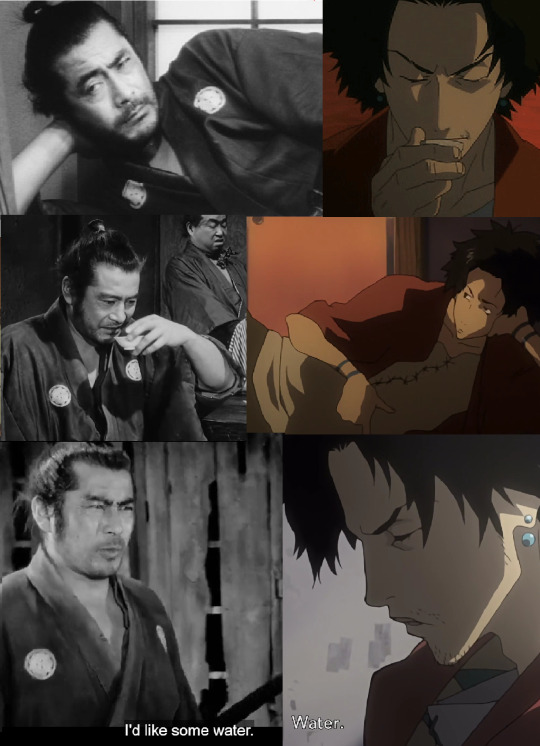
In regards to its plot and tone, no film is referenced more in Samurai Champloo, than the way episodes 3 and 4 references 1961's Yojimbo. The body language of Mifune here is also uncanny to Mugen, with the way he scratches himself and strokes his chin. While the story itself has serious undertones, it is a dark comedy at heart that makes light of even the most serious of situations. Even the opening of the film has a dog nonchalantly walking by with a severed human hand held in its mouth, while playful music begins.
Plot: A wandering ronin known as Sanjuro stumbles upon a town in which two Yakuza gangs are warring with one another for power. One owns a gambling hall, the other a brothel. The samurai shows an interest in working for both gangs as their bodyguard, getting them to each pay higher and higher for his services. They both want to use his sword skills to defeat the opposing gang. But the wandering samurai plays both sides.
(A gang war, a down on his luck bodyguard for hire, a gambling den, a brothel, and a damsel in distress are all aspects used in Episodes 3 and 4 of Samurai Champloo.)
The film begins with Mifune’s character, a broke ronin that wanders on a whim. He throws a stick in the air, and uses how it lands to point him in the direction he should go. This laid-back way of relying on either chance or fate for making decisions, seems to be referenced directly by Mugen, when he specifically throws the coin in the air to decide if he will accompany Fuu or if he will duel Jin.
Sanjuro's first line of dialogue: "I'd like some water."
Mugen's first line of dialogue in the series: "Water."
Sanjuro later enters a bar and asks an old man for food there, despite having no money. This old man tells him the situation of the gang war and becomes his closest ally in the film.
(This is referenced when Jin talks with an old man in Episode 3, learns of the town’s gang war, and gets free food from him. Sanjuro saves this old man at the end of the film. In episode 4, Jin repays the old man for the free food and is given an umbrella.)
In order to be hired by one of the gangs, Sanjuro demonstrates his skills by slaying three of the opposing gang’s thugs.
(Jin references this exact dialogue when he shows off his skills to Sousuke and cuts the robes of three of the opposing gang’s thugs.)
Sanjuro: "Do you want to buy me as a bodyguard? I’ll show you what I’m worth."
Jin: "Boy. Want to hire a bodyguard? I’ll show you my skills right now."
The character of Sanjuro: Initially, Sanjuro comes off as whimsical and uncaring, almost as if he just finds enjoyment in pitting these two gangs against each other, laughing as he watches them be cowards or be idiots thinking they can outsmart him. But, as it turns out, Sanjuro is an honorable ronin that does not care for money at all. Instead, he wants to end both gangs and bring peace back to this little town. The gold he swindles from the gang is not used on himself. More on that gold in a bit...
Both Mugen and Jin reference different aspects of Sanjuro. Throughout most of the film, Sanjuro comes off as calm and collected and skillful like Jin. He also displays amusement and jovialness, similar to how Mugen joins the Nagatomi gang for fun. Mugen and Jin work for opposing gangs, similar to how Sanjuro works for both gangs at one point or another.
Jin shares Sanjuro’s ideologies to do the chivalrous deed of stopping corruption and bringing peace. Mugen is more emotional in his reasoning: all his actions are either for his own amusement or his intense desire to save Fuu.
While Jin's chivalry is a larger picture, Mugen's heroism is specific to saving only one person.
It is not until later in the film, that we get the first glimpse of a different side of Sanjuro. Intensity and rage. Yet, he also shows a previously unshown care for protecting people. The moment it happens...is when he saves a woman.
This woman Sanjuro saves is the wife of a farmer who lost her because of his gambling debts. The gang that owned the gambling den forced her into being their ally’s mistress. She was held captive in the man’s house, as he raped her night after night.
(Fuu references her in these episodes, as she was thrown into prostitution at the Nagatomi gang’s brothel. Episode 11’s Shino also shares this identical fate of being the collateral for her husband’s gambling debts.)

Sanjuro betrays the gang he is supposed to be working for, barges in, and kills six men to save her, and reunites her with her husband and child. All the while, he berates her and threatens her. While he comes off as rough and callous here, it also shows how much he cares. It is as if he cannot display his kindness without coming off as rough.
(The few times it is ever shown Mugen cares for more than himself, is when we see his concern for Fuu. In Episode 4, despite quitting working for the Nagatomi gang and having no reason to go back, Mugen thinks about Fuu trapped in the brothel as he walks away in the rain. He then betrays the gang he’d previously been working for, breaks into their brothel and kills several guards, implied by the blood on his sword, and tries to rescue Fuu. Unfortunately, his chivalry goes unrewarded and unnoticed, as she’d already escaped on her own. Just like Sanjuro, he is always cruel in his words to Fuu even when he does kind deeds in saving her multiple times in the series. Even in the moment he breaks into the brothel to rescue her, he calls Fuu an idiot, just like Sanjuro does.)
Sanjuro: "You're free. Get dressed!"
The woman initially does not move. He roughly throws her kimono at her face, grabs her by the arm and drags her from the house.
Sanjuro: "Idiot!"
Mugen: "She ran away? That idiot!"
After Sanjuro pushes her out of the house, and then makes a mess inside, to make it appear the rival gang has attacked instead, he comes back outside...only to find her and her family still there, bowing on the ground to him, crying, thanking him for rescuing her. He gets them off the ground and throws his previously gained gold at them.
Sanjuro: "You idiots! Hurry up! Stop that! Stop crying! It's pathetic. If you cry, I'll kill you! Go! Don't ever come back!"
Mugen: "I ain't gonna die. Have some faith in me. Get outta here. Go. RUN!"
(This urging and yelling at the family to leave seems to be referenced in Episode 25 when Mugen has to tell Fuu three times to run, and finally yells at her, for her to reluctantly leave. The crying concept is also something Fuu exhibits, as she cries for Mugen over five times in the series overall.)
Fuu: "It seems like all I ever do is cry. And here I thought I could make it on my own..."
Mugen: "You idiot."
(In episode 11, while Jin does not share Sanjuro's dialogue, he shares Sanjuro’s actions by grabbing Shino's wrist and pulling her towards freedom. Here is a link to a previous post I've made on Mugen and Jin's identical actions and symbolism in regards to Fuu and Shino.)
Sanjuro’s final confrontation in the film pits him against a gangster who most notably wields a pistol. However, Sanjuro beats him despite only having a sword and a knife. He throws the knife at the man’s arm to make him miss his shot and cuts him down.
This sequence is reminiscent of how Mugen throws his tanto as a last resort in Episode 26, as well as how Jin dodges Mukuro’s gun in Episode 14.
Rashomon: Mifune as Tajomaru the Bandit
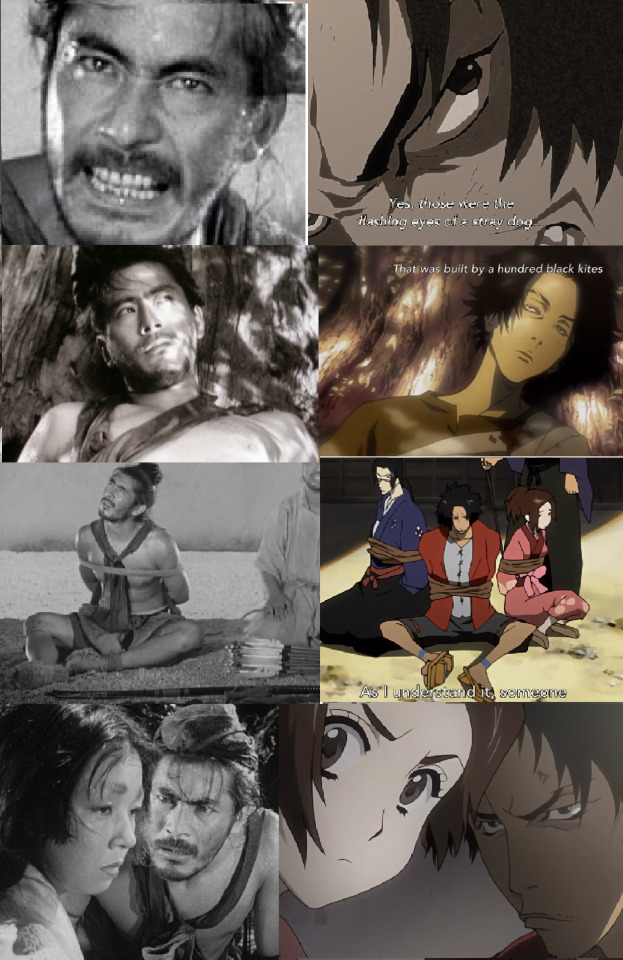
Like Kikuchiyo in Seven Samurai, Tajomaru the bandit is uncouth, wild, crazed and lustful.
Unlike Seven Samurai and Yojimbo however, 1950's Rashomon is a far darker story with no comic relief, gags, or lighthearted moments. It is a crime/psychological thriller that explores the nature of truth and the darker shades of humanity. The plot centers around a trio: a wild bandit, a reserved samurai, and the samurai’s wife that is caught between these two men that duel to the death because of her.

Plot: There is a trial for the murder of the samurai and the rape of his wife, and the mystery surrounds who exactly did what, and what actually happened that day. Each character gives a different testimony leading up to the events of the samurai’s murder, making up lies about what really happened, all for the sake of their pride and painting themselves in a better light.
The bandit claims he tricked and tied up the samurai, and seduced his wife. Then, under her command, is told to kill her husband, so that two men would not know her shame of having two lovers. The warriors had a fair, skillful fight. The bandit claims he won and compliment's the samurai's prowess. But the wife tricked him and fled the scene.
Tajomaru: "I thought I saw a goddess. At that moment I decided to have her, even if I had to kill her man. But if I could have her without killing, all the better."
Tajomaru: "She became very pale and stared at me as though her eyes were frozen. She looked like a child when it turns suddenly serious. The sight of her made me jealous of that man. I started to hate him. I wanted to show her what he looked like, all tied up like that. I hadn't even thought of a thing like that before, but now I did."
The woman claims she was raped by the bandit, who fled the scene. She begged her husband to forgive her, but he no longer wanted her anymore either. She begged her husband to kill her for the shame of being raped, but he only looked upon her with cold indifference. Out of distress and trauma, she murdered her husband.
The spirit of the deceased samurai, who speaks through a medium, claims that the bandit and his wife made love, and then she asked the bandit to murder him. The bandit was so disgusted by her request, that he untied her husband, left the wife there and fled the scene. Pained by his wife’s betrayal, the samurai killed himself.
It turns out that there is both truths and lies found in each of their versions of the story.
The truth: The bandit had indeed raped the wife. But then he asked her to forget her husband and marry him instead, as he had fallen in love with her. The wife however, rejected him and freed her tied up husband. But her husband made no move to fight the bandit, and said she was not worth risking his life for. The bandit did not want to fight the samurai either. Disgusted by both her rapist and her husband, the wife criticizes them both as cowards, saying that “real men should fight for a woman’s love”. Still, both of the men had no desire to kill each other, and were actually terrified of doing so. Urged by her to fight, the quivering men reluctantly do, but it is pitiful and sloppy and the bandit only wins out of dumb luck.
The Wife to her husband: "It's you two who are weak! If you are my husband, kill this man, then you can tell me to kill myself! But you're not a real man. That is why I was crying. I'm tired of this farce."
The Wife to the bandit: "I thought Tajomaru might find some way out. I thought that if he would save me I would do anything for him! I wanted you to take me away. I would have been yours! But he's not a man, either. He's just like my husband. Remember, a woman loves a real man only. A man has to make a woman his by his sword."
(Throughout the series, Mugen uses his sword to save Fuu. In Episode 25, Mugen gives up his sword for Fuu, just like how Jin gave up his swords in Episode 11 to the brothel, for Shino.)
Samurai Champloo is a sharp contrast to this story, showing a warmer, kinder version of this trio dynamic, with all of the character’s ideals, feelings and actions a complete reverse to Rashomon’s cast.
As a samurai’s daughter, Fuu would have been best suited socially to marry a samurai like Jin, had she or Jin still possessed any title. However, the romance of the anime is not between Fuu and Jin. Unlike the samurai’s wife, she does not choose Jin over Mugen.
Unlike the samurai who shuns his wife after her rape, Jin is implied to honorably offer to keep traveling with Fuu after the end of the series in Episode 24 in the river bank scene, despite no romantic feelings between them. Fuu however, is implied to decline him out of fear of this meaning Jin would survive their final duel and Mugen would be dead. She cries at the mention of Mugen and apologizes to Jin over it.
Mugen is shown to be a rough and callous outlaw, with a past similar to Tanjuro the bandit, as he was once both a thief and a pirate. In Japanese, he even threatens to rape Fuu while she’s unconscious in Episode 2, and tells her to show him her breasts in Episode 11. However, despite his cruel and lecherous words, he never actually attempts to force himself on her or hurt her. Instead, he honorably protects and rescues her throughout the series.
Whereas the wife is traumatized and disgusted by the bandit rapist, Fuu is heavily implied to develop romantic feelings for Mugen.
Unlike the bandit and the samurai, Mugen and Jin have no fear of fighting and constantly want to kill each other. Also unlike Rashomon, the two never duel to the death, because of their friendship.
Unlike the samurai’s wife, rather than urge the two men to fight and kill each other, Fuu begs them not to.
Bonus Facts: Ghost of Tsushima, Kurosawa and Champloo
Writers of the 2020 video game Ghost of Tsushima have said how much of it is inspired by Akira Kurosawa and Toshiro Mifune’s samurai films. There is even a “Kurosawa Mode”, in which you can play with a black and white filter, a film grain overlay and audio modifications that emulate movies from the 1950’s. …But, how does this connect into Samurai Champloo?
The main character is named Jin. More interesting, in Japanese, he is voiced by Kazuya Nakai: Mugen’s voice actor. It would seem that his voice truly is the closest thing to a modern Toshiro Mifune.
Toshiro Mifune and Clint Eastwood=Samurai Champloo and Cowboy Bebop=Mugen and Spike Spiegel
Samurai Champloo is known to be the spiritual successor of Shinichiro Watanabe’s previous work: Cowboy Bebop. Both Spike and Mugen and Faye and Fuu share uncanny parallels in their plots and scenes. This can be seen most notably in the scenes where Faye and Fuu are both held hostage in a Church and how Faye and Fuu nurse Spike and Mugen back to health after they wake up from a near identical flashback sequence. Mugen and Spike are both running from a criminal past. Faye and Fuu are both chasing a past they cannot remember. Yet, where Bebop is dark and solemn, Champloo is far more positive and upbeat. (I will likely make another essay that delves deeply into all the parallels and mirror reversals between them).
Interestingly, Kurosawa’s samurai films were remade into cowboy westerns. Each movie shares identical plots and near identical scenes with a different setting.
Fistful of Dollars is a western remake of Yojimbo.
Magnificent Seven is a western remake of Seven Samurai.
Clint Eastwood is also the star of both A Fistful of Dollars, A Few Dollars More and The Good, The Bad and The Ugly in which he plays the same character, just as Toshiro Mifune is the star of both Yojimbo and its prequel film Sanjuro.
In Episode 1 of Cowboy Bebop, Spike wears a poncho, which is Eastwood’s iconic outfit
In Conclusion
Mugen's mannerisms and dialogue is based on all three of Mifune's roles in Kurosawa's samurai films. Each character also bring forth specific characteristics that define Mugen.
From Seven Samurai's Kikuchiyo, Mugen takes his backstory of a peasant, his resentment and hatred of samurai, his competitive nature, and his comical goofiness. Most importantly, Mugen and Kikuchiyo share the representation of having the heart and soul of a noble samurai, despite not being born as one, and his iconic white triangle.
From Yojimbo's Sanjuro, Mugen takes his role as a hungry, broke bodyguard for hire, and shows his desire to enjoy himself, while also displaying his chivalry. But most importantly, two aspects of Mugen's hidden personality that is buried beneath goofiness and apathy, comes from Sanjuro. The first is his powerful intensity and rage that is buried away. (Sara references this in Episode 20). The second is his care to protect those who are unable to protect themselves. But, he is only able to show his care through actions rather than words, as his dialogue comes off as callous and cruel.
From Rashomon's Tajomaru, Mugen takes his role as a notorious bandit-like character with a criminal past. In personality, he takes his wildness, cruelty, and his intense pride. Most importantly, he assumes his role in a trio dynamic, in which he develops a romantic interest in a woman, and a rivalry with a reserved samurai. But his actions are reversed, in which he never forces himself on Fuu and never ends up killing Jin.
And a little bonus for the Fuugen Shippers...
Aside from his roles in Akira Kurosawa films, Toshiro Mifune also starred as the love interest in a romantic comedy… Its title?
Himawari Musume. Sunflower Girl.
#akira kurosawa#toshiro mifune#samurai champloo#mugen samurai champloo#fuugen#seven samurai#yojimbo#rashomon#samurai#shinichiro watanabe#cowboy bebop#anime#ghost of tsushima
965 notes
·
View notes
Text
I’m thinking about them (Fuu and Mugen) again
Send help
#like they are both so self centered but are willing to recklessly put their lives at risk to protect the other#though perhaps this is also an act of selfishness because they know it would destroy them if the other died#they keep saving each other while adamantly remaining blind to the fact that they care for (love) the other deeply (desperately)#fuugen#samurai champloo
4 notes
·
View notes
